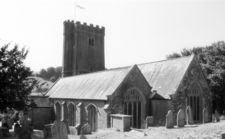Robert Herrick: Difference between revisions
imported>Martin Wyatt (→Life) |
imported>Martin Wyatt mNo edit summary |
||
| Line 2: | Line 2: | ||
'''Robert Herrick''' (1591-1674) was one of the finest English lyrical poets<ref>Drabble, M.(ed). The Oxford Companion to English Literature. Oxford University Press. 1995</ref> and a royalist clergyman, incumbent of Dean Prior in [[Devon]]. | '''Robert Herrick''' (1591-1674) was one of the finest English lyrical poets<ref>Drabble, M.(ed). The Oxford Companion to English Literature. Oxford University Press. 1995</ref> and a royalist clergyman, incumbent of Dean Prior in [[Devon]]. | ||
== Life == | == Life == | ||
{{Image|Deanprior001.jpg|right|225px|Dean Prior church}} | |||
It is known that Herrick was the seventh child of a London Goldsmith, Nicholas Herrick, that he was educated sufficiently to attend St John's College, [[University of Cambridge|Cambridge]], and that before he had published anything he was known as one of the "Sons of Ben" (or Tribe of Ben), a group of poets around [[Ben Jonson]] and adhering to his conception of lyrical poetry. Having served as an army chaplain in the Duke of Buckingham's vain attempt to support the [[Protestant]]s of La Rochelle, he was appointed as vicar of Dean Prior in [[Devon]]. Here he seems to have been simultaneously repelled by the rustics and appreciative of the rhythms of rural life. Seventeen years later Parliament evicted him from his living, and he returned to London. His unrepentant [[royalism]] was demonstrated by his dedicating his collection of lyrics, ''Hesperides'', to the Prince of Wales, soon to become [[Charles II]] on the execution of his father. At the [[Restoration]] he was restored to Dean Prior, where he died in 1674. He was buried in an unmarked grave, though there is a memorial tablet of 1857 in the church. | It is known that Herrick was the seventh child of a London Goldsmith, Nicholas Herrick, that he was educated sufficiently to attend St John's College, [[University of Cambridge|Cambridge]], and that before he had published anything he was known as one of the "Sons of Ben" (or Tribe of Ben), a group of poets around [[Ben Jonson]] and adhering to his conception of lyrical poetry. Having served as an army chaplain in the Duke of Buckingham's vain attempt to support the [[Protestant]]s of La Rochelle, he was appointed as vicar of Dean Prior in [[Devon]]. Here he seems to have been simultaneously repelled by the rustics and appreciative of the rhythms of rural life. Seventeen years later Parliament evicted him from his living, and he returned to London. His unrepentant [[royalism]] was demonstrated by his dedicating his collection of lyrics, ''Hesperides'', to the Prince of Wales, soon to become [[Charles II]] on the execution of his father. At the [[Restoration]] he was restored to Dean Prior, where he died in 1674. He was buried in an unmarked grave, though there is a memorial tablet of 1857 in the church. | ||
Revision as of 16:01, 18 August 2013
Robert Herrick (1591-1674) was one of the finest English lyrical poets[1] and a royalist clergyman, incumbent of Dean Prior in Devon.
Life
It is known that Herrick was the seventh child of a London Goldsmith, Nicholas Herrick, that he was educated sufficiently to attend St John's College, Cambridge, and that before he had published anything he was known as one of the "Sons of Ben" (or Tribe of Ben), a group of poets around Ben Jonson and adhering to his conception of lyrical poetry. Having served as an army chaplain in the Duke of Buckingham's vain attempt to support the Protestants of La Rochelle, he was appointed as vicar of Dean Prior in Devon. Here he seems to have been simultaneously repelled by the rustics and appreciative of the rhythms of rural life. Seventeen years later Parliament evicted him from his living, and he returned to London. His unrepentant royalism was demonstrated by his dedicating his collection of lyrics, Hesperides, to the Prince of Wales, soon to become Charles II on the execution of his father. At the Restoration he was restored to Dean Prior, where he died in 1674. He was buried in an unmarked grave, though there is a memorial tablet of 1857 in the church.
Poetry
Unlike John Donne, Herrick did not totally repudiate the "profane" verse published in Hesperides, though in the same year he published his Noble Numbers, expressing aspects of his Christian belief, in which he expressed a conventional regret for his other poems. After these two collections he is not known to have written anything.
His reputation remained dormant until the later 19th century, when Swinburne produced an edition of his work. Since then it has never been in doubt, with his poems being anthologised, and several editions of all or some of his work being produced. His lyrics show great care in rhythm and assonance.
Allusions
Herrick is one of the main characters in Rose Macaulay's historical novel They Were Defeated.
- ↑ Drabble, M.(ed). The Oxford Companion to English Literature. Oxford University Press. 1995
